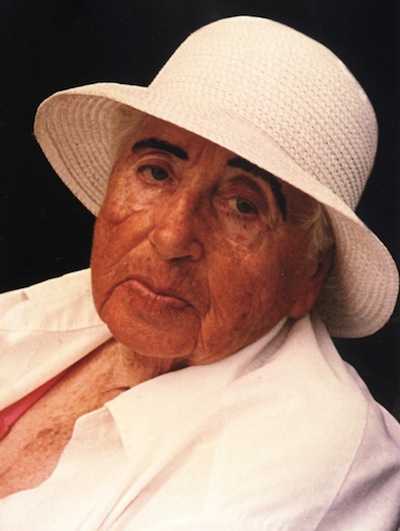
by Sheva Zucker
Candles of Song: “My Father’s Letters from America” by Rajzel Zychlinksy
Yiddish poems about mothers, in memory of my mother, Miriam Pearlman Zucker, 1914-2012.

Photo of Rajzel Zychlinski
Rajzel Zychlinksy (1910-2001) was born in Gombin, Poland in 1910. Her first book of poems, Lider (Poems), published in 1936, included a very laudatory foreword by the celebrated poet Itsik Manger. She and her husband, the psychiatrist and author, Dr. Isaac Kanter, left their home in Warsaw during the Second World War and took refuge in Russia where their son Marek was born.
In 1951, Zychlinksy emigrated to New York. She lived there until the last few years of her life, when she moved to Berkeley, California, to join her son. She published several volumes of poetry in Yiddish, among them, Tsu loytere bregn (To clear shores), 1948, Shvaygndike tirn, (Silent doors), 1962), Di November-zun (The November sun), 1977 and Naye lider (New Poems), 1993. In 1975 she was awarded the prestigious Manger Prize for Yiddish Poetry. The Holocaust is a major theme in her work.
A fine selection of her poems has been published in English in the book God Hid His Face: Selected Poems of Rajzel Zychlinsky, translated by Barnett Zumoff, Aaron Kramer, and Zychlinsky’s son, Marek Kanter.
Here, Mayn Tatns Briv Fun Amerike, by Rajzel Zychlinksy, read by Sheva Zucker:
My Father’s Letters From America
My father’s letters from America
to my mother
always began:
Best of women, Dvoyre!
But if my mother was best,
most beautiful,
why did he run
to America three times?
I know, I know,
Momma was pious,
she wouldn’t move to America
and see her children
work on the Sabbath.
Momma was frum.
Should I go to Chicago
for an answer?
Find the cemetery
where my father rests in his grave?
At his head
he has a stone–
And momma?
Over the fields of Poland blow
the ashes of her bones.
Naye lider. Tel-Aviv, 1993
Translated by Seymour Levitan
Mayn Tatns Briv Fun Amerike
Mayn tatns briv fun Amerike
tsu mayn mame –
hobn zikh shtendik ongehoybn:
Beste froy Dvoyre!
Un oyb di mame iz geven di beste,
di shenste,
vos iz er epes gelofn
dray mol kin Amerike?
Kh’veys, kh’veys,
di mame iz geven frum,
zi hot nit gevolt forn kin Amerike
un zen ire kinder
geyn arbetn dort Shabes.
Di mame iz geven frum.
Un efsher zol ikh forn kin Shikago
nokh an entfer?
Oyszukhn dort dos beys-oylem
vu mayn tate rut in a keyver,
un hot a matseyve tsu kopns,
a shteyn –
Un di mame?
Der vint hot tseblozn iber di poylishe felder
dem ash fun ir gebeyn.
מײַן טאַטעס* בריװ פֿון אַמעריקע
מײַן טאַטעס בריװ פֿון אַמעריקע
צו מײַן מאַמע —
האָבן זיך שטענדיק אָנגעהױבן:
בעסטע פֿרױ דבֿורה!
און אױב די מאַמע איז געװען די בעסטע,
די שענסטע,
װאָס איז ער עפּעס געלאָפֿן
דרײַ מאָל קיין אַמעריקע?
כ’װײס, כ’װײס,
די מאַמע איז געװען פֿרום,
זי האָט ניט געװאָלט פֿאָרן קיין אַמעריקע
און זען אירע קינדער גײן אַרבעטן דאָרט שבת.
די מאַמע איז געװען פֿרום.
און אפֿשר זאָל איך פֿאָרן קיין שיקאַגאָ
נאָך אַן ענטפֿער?
אױסזוכן דאָרט דאָס בעת־עולם
װוּ מײַן טאַטע רוט אין אַ קבֿר,
און האָט אַ מצבֿה צו קאָפּנס,
אַ שטײן —
און די מאַמע?
דער װינט האָט צעבלאָזן איבער די פּױלישע פֿעלדער
דעם אַש פֿון איר געבײן.
נײַע לידער, ישׂראל־בוך,1993
*בײַ פּוילישע ייִדן קען מען הערן סײַ „טאַטעס” סײַ „טאַטנס”?
Zychlinski’s father did indeed immigrate to the United States several times and was unable to convince his wife to come. She believed that American was no place for pious Jews.
Poems cross-posted with ShevaZucker.com.
Dr. Sheva Zucker is currently the Executive Director of the League for Yiddish and the editor of its magazine Afn Shvel. She has taught and lectured on Yiddish language, literature and culture on five continents.